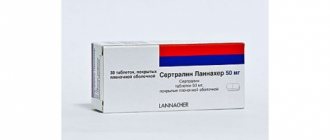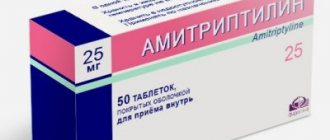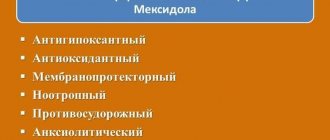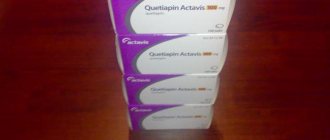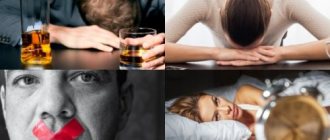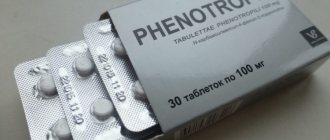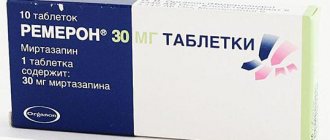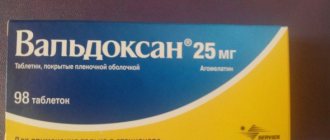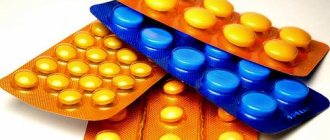Mechanism of action of the drug
Afobazole® is a selective non-benzodiazepine anxiolytic. Acting on sigma-1 receptors in nerve cells of the brain, Afobazol® stabilizes GABA/benzodiazepine receptors and restores their sensitivity to endogenous inhibitory mediators. Afobazol® also increases the bioenergetic potential of nerve cells and protects them from damage (has a neuroprotective effect). The effect of the drug is realized primarily as a combination of anxiolytic (anti-anxiety) and mild stimulating (activating) effects.
Afobazole® reduces or eliminates feelings of anxiety (preoccupation, apprehension, apprehension, irritability), tension (fearfulness, tearfulness, restlessness, inability to relax, insomnia, fear), somatic manifestations of anxiety (muscular, sensory, cardiovascular, respiratory, gastrointestinal -intestinal symptoms), autonomic disorders (dry mouth, sweating, dizziness), cognitive disorders (difficulty concentrating, impaired memory).
The effect of the drug develops on days 5-7 of treatment. The maximum effect is achieved by the end of 4 weeks of treatment and persists after the end of treatment for an average of 1-2 weeks. Afobazole® does not cause muscle weakness, drowsiness and does not have a negative effect on concentration and memory. When using it, drug dependence does not form and “withdrawal” syndrome does not develop.
Is there anything stronger than the sedative Afobazol? “Analogs” of the drug
Afobazole is a “light” tranquilizer, due to the fact that it does not inhibit the functioning of the nervous system, but restores the natural course of inhibition processes in the central nervous system; the therapeutic effect develops gradually - usually within the 1st week of administration. There are drugs with faster action, and they belong to the group of benzodiazipenes. But their serious drawback is that they cause a large number of severe side effects, among which drug dependence, addiction, daytime sleepiness, decreased memory and attention, and muscle tone stand out.
"Analogue" 1 - Grandaxin
Grandaxin belongs to the benzodiazepine class of drugs and a subgroup of daytime tranquilizers. It is widely used for neuroses, relieves symptoms of tension, restlessness, anxiety, and helps get rid of obsessive thoughts of a negative nature. When using the drug, a number of side effects may occur. From the gastrointestinal tract - decreased appetite, increased gas formation, nausea. From the nervous system - headache, insomnia, agitation, confusion; from the respiratory system - respiratory depression. And if you do not take into account the peculiarities of therapy in patients with epilepsy, they may react with convulsive seizures.
Analogue 2 - Phenazepam
A tranquilizer with pronounced anti-anxiety and sedative effects. Quickly eliminates anxiety, tension, obsessive fears, but can cause drowsiness, drug dependence and impair coordination of movements and muscle tone. It should not be taken simultaneously with certain drugs used to treat somatic diseases.
Why is it taken?
Afobazole reduces or eliminates feelings of anxiety (concern, bad feelings, fears), irritability, tension (fearfulness, tearfulness, anxiety, inability to relax, insomnia, fear), depressive mood, somatic manifestations of anxiety (muscular, sensory, cardiovascular, respiratory , gastrointestinal symptoms), autonomic disorders (dry mouth, sweating, dizziness), cognitive disorders (difficulty concentrating, weakened memory), including those arising from stress disorders (adaptation disorders). Afobazole is used in adults for anxiety conditions, namely:
- generalized anxiety disorders;
- neurasthenia;
- adaptation disorders.
In patients with various somatic diseases, namely:
- bronchial asthma;
- irritable bowel syndrome;
- systemic lupus erythematosus;
- IHD;
- hypertonic disease;
- arrhythmias;
- dermatological, oncological and other diseases.
During treatment:
- sleep disorders associated with anxiety;
- neurocircular dystonia;
- premenstrual syndrome;
- alcohol withdrawal syndrome;
- to alleviate the “withdrawal” syndrome when quitting smoking.
Afobazole is most effective in eliminating anxiety in cardiovascular diseases, premenstrual syndrome and neurocirculatory dystonia.
Indications for use
The effect of the drug is not accompanied by hypnosedative effects. It does not have muscle relaxant properties or have a negative effect on memory and concentration. Even with long-term use of Afobazole, drug dependence does not develop and there is no withdrawal syndrome. Due to the stabilization of membranes in GABA receptors, it has a dual effect on the human body, simultaneously providing an anxiolytic (anti-anxiety) and mild stimulating effect. The medication is prescribed to adults in the following situations:
- anxiety disorder;
- elimination of somatic symptoms in bronchial asthma, dermatological diseases, arrhythmia, hypertension;
- adjustment disorders;
- neurasthenia;
- sleep disorders;
- neurocircular dystonia;
- alcohol syndrome;
- depression;
- stress.
The drug can be prescribed to eliminate anxiety and somatic symptoms, menopausal symptoms in women, and systemic lupus erythematosus. The medication is used in the treatment of premenstrual syndrome, as well as irritable bowel syndrome. The drug is prescribed for dyssomnia, arrhythmia and other cardiac disorders.
Prices in online pharmacies in Moscow
Name of the drug Series Price, rub. Go to the online pharmacy
| Afobazole, tablets 10 mg; contour packaging 20 cardboard pack 3; No. LS-000861, 2010-07-23 from Pharmstandard-Leksredstva (Russia) | 221.00 |
| Afobazol® | 228.33 |
| Afobazol® | 231.50 |
| Afobazole, tablets 10 mg; contour packaging 20 cardboard pack 3; No. LS-000861, 2010-07-23 from Pharmstandard-Leksredstva (Russia) | 273.00 |
How to take Afobazol for an adult?
The dosage, frequency of administration of the drug, and duration of the course depend on the age, general condition of the patient, stage, form, type of disease, and individual characteristics of the body. The dose is selected individually in each specific case. The average recommended therapeutic dose of the tranquilizer is 10 mg three times a day (30 mg). For medical reasons, the daily dosage is increased to 50-60 mg. Afobazole tablets should be taken after meals. Without chewing the pills, wash them down with a small amount of boiled or still water.
The maximum permissible duration of a continuous course is three months.
Keep approximately equal time intervals between doses. As a rule, the duration of the treatment course is two to four weeks. If necessary, therapy is extended by the attending physician. Treatment with afobazole can be continued no earlier than after a month. You can assess whether the drug is suitable for you already on the fifth or sixth day of use. If the result is absent or poorly expressed, you can discontinue afobazole and begin treatment with another medication. Before ending therapy, there is no need to reduce the dose of Afobazole, since the medicine is not addictive and there is no withdrawal syndrome. Adverse symptoms also occur in extremely rare cases.
How should adults take the tablets?
According to the instructions for use, Afobazole is taken orally after meals with water. The dosage depends on the nature of the underlying pathology. For adults, the minimum single dose in tablets is 10 mg, and the daily dose is 30 mg. It is recommended to distribute the dose into 3 doses during the day. The effectiveness of taking the drug can be noticed after a few weeks, and the maximum effect appears after a month. In some cases, the doctor may increase the daily dose to 60 mg and extend treatment to several months. In the case of taking Afobazole, it is important when it is taken - before or after meals, since the safety of therapy depends on this. The optimal option is to take it half an hour after a meal.
For VSD and panic attacks, it is very important to follow the rules for taking the medication. It must be remembered that the use of Afobazole for one-time relief of an attack is not effective. In order to see the result and eliminate the appearance of attacks, you must take the drug regularly. For severe forms of panic, drink 6 tablets 3 times a day. In case of mild forms of disorders, doctors recommend taking 3 tablets 3 times a day.
Treatment for panic attacks can last from several weeks to several months, which completely depends on the severity of the attacks. The results from taking Afobazole last for several weeks after stopping the pills.
Making a choice
So, let's return to the main question of our article. What to choose for the treatment of nervous disorders, panic attacks and stress - “Afobazol” or “Grandaxin”? Both drugs are used to treat the same diseases and relieve similar symptoms, and they cost about the same. Considering the properties of the medications considered, as well as reviews about them, we can conclude that Grandaxin acts somewhat more mildly, it is allowed to be used by elderly people, and it is not prohibited for pregnant women during the second and third trimester. On the other hand, buyers note a large number of side effects that appear after taking the drug Grandaxin. The second product has fewer of them. One way or another, each of the drugs has its pros and cons, but the final decision on the prescription and duration of treatment must be made by the doctor. Moreover, often the patient is not able to diagnose severe depression in himself, and also cannot understand how severe their stress is. By prescribing one of the described drugs to yourself, you can only aggravate the situation, harm your health, but do not help in any way.
Contraindications and side effects
Afobazole has side effects and contraindications, but they are minor. The drug is not taken:
- in childhood (up to 18 years);
- during pregnancy and lactation, since the medicine enters the child’s body with milk;
- with the individual reaction of the body to the components of the drug;
- in case of lactose intolerance (auxiliary component).
All contraindications must be taken into account when purchasing Afobazole. The main side effect is allergic reactions, which is extremely rare. You may experience headaches that go away after some time. Memory and reaction speed are not affected by the medicine, so there are no restrictions on the type of activity. You can work with complex mechanisms and drive a vehicle. Drowsiness and sedation are possible only with an overdose.
Aphobazolum has good compatibility with other drugs when taken simultaneously. The exception is antidepressants, which are prescribed separately. Is it possible to drink alcohol during treatment? The medicine does not react with ethanol, but if you take alcohol during treatment with Afobazole, the effect of the treatment is neutralized. If side effects occur, you should stop taking the drug and contact a specialist to adjust the treatment.
Features of therapy for stress and anxiety disorders
Afobazole helps cope with symptoms of stress and anxiety. Despite this, it does not affect the causes of these conditions. When you stop taking the medication, attacks may occur again. To eliminate the causes of stress and anxiety, you need to contact specialists.
To determine the effectiveness of the drug, studies were conducted at the Moscow and St. Petersburg psychoneurological research institutes. It has been proven that Afobazol is similar in action to Diazepam. The medicine differs from Diazepam in its high tolerability, lack of muscle relaxant effect and inhibition of cognitive functions. This was the reason for further research.
Scientists considered the main goal to establish the effectiveness of the drug in cases of anxiety. To do this, a naturalistic study was conducted in which people from 18 to 65 years old with nervous disorders, depression and anxiety participated. Exceptions were cases of schizophrenia, epilepsy, frequent panic attacks, and somatic diseases in the acute stage.
The subjects took the drug three times a day, 15-20 mg, for a month and a half. To better determine effectiveness, different evaluation techniques have been used. Each patient had his own card with notes on his condition, which was checked every 7 days.
194 patients were studied, 45 men, 149 women. Since nervous system disorders are more common in women, most of them were present. The experiment involved people with disorders lasting from several months to several years. For treatment, patients had previously used antidepressants or tranquilizers.
In the first week of the study, patients' anxiety levels decreased by 22%. In week 3 the numbers rose to 50%. By week 6, the rate reached 73%. Analysis of the results showed the presence of a constant and harmonious decrease in the severity of anxiety. Starting from the first week, patients complained less about their health.
Earlier studies have shown that side effects occur to a greater extent in the first week.
These effects were represented by increased anxiety, drowsiness, and sleep disturbance. Their most acute manifestation was an exacerbation of somatic disease. In general, side effects were very rare. The results showed that the effect of Afobazole does not depend on age or gender. It has also been shown that the drug reaches its maximum effect in the 3rd week after the start of treatment. At the end, it was found that the stimulating effect prevailed over the sedative.
The main disadvantage of this study is its lack of objectivity. This is due to the fact that not all patients could soberly assess the results of the drug. And the positive effect could arise solely due to people’s self-hypnosis.
To avoid such situations, the double placebo method is used, where half of the patients are given a placebo pill and the other half are given the real drug. Patients do not know which pills they are being treated with and are unaware of important details of the study. It is this method that helps determine that the effect of the drug is based on its properties, and not on the patients’ self-hypnosis. No data on such research methods have been found for Afobazole.
Studies have confirmed the high effectiveness of the drug in the treatment of neurotic disorders. The drug is also well tolerated and easy to use.
This drug falls into the group of tranquilizers, but at the same time has a very gentle effect on the human body. It does not cause addiction in the patient and does not provoke the development of withdrawal syndrome upon completion of therapy. In order to get only benefits from taking the drug, you must strictly follow the instructions for using Afobazol.
Today, the only form of release of Afobazole is tablets. They are painted in a snow white/cream color. There are two dosage options for the main active ingredient in pills – 5 and 10 mg. Tablets are packaged in blisters or glass jars (from 10 to 100 pieces, depending on the packaging option).
The main active component of the product is fabomotizol. The product also includes auxiliary ingredients: starch (potato), lactose monohydrate and some others. The composition turned out to be the same for both dosage options.
Afobazole and alcohol: compatibility consequences
For various diseases, the consequences of simultaneous use of the drug and alcohol can be very different. Despite statements about the absolute safety of the combination of Afobazole and alcohol, it is still better to consider some diseases specifically.
- Neuroses
. Almost all neuroses are caused by some disruptions in the activity of the central nervous system or its functional disorders. Quite often they are a consequence of stress or excessive mental stress. Some patients try to relieve stress by starting to drink alcohol. Most likely, the medicine and alcohol are really compatible, no particular harm will be done, but the effect of the treatment will be zero. - Organ diseases
. Any disease of internal organs aggravates the damage caused by ethanol. For example, consider peptic ulcer disease. Successful therapy for this disease is largely determined by blood circulation in the affected area. Better blood supply to tissues leads to more successful healing.
Alcohol rapidly dilates blood vessels at first (which is somewhat dangerous due to possible internal bleeding), but subsequently a sharp narrowing is observed. Thus, normal blood supply is disrupted and healing becomes more difficult. Taking Afobazole normalizes the condition of the walls of blood vessels, relieves nervous tension, which ultimately promotes better blood circulation. You should know that the combination of Afobazole and alcohol can completely destroy the therapeutic effect of the drug.
Is it possible to drink constantly?
The duration of taking Afobzole can only be determined by a doctor. It depends on various factors. In general, the answer to the question: “How long can you take Afobazol without a break?” depends on the level of anxiety, self-doubt and character traits such as increased vulnerability, a tendency to emotional stress reactions, and much more.
When starting to take Afobazole, you should pay attention to the fact that the medicine will not show maximum effectiveness from the first day. Basically, the first results can be noticed on the 5-7th day of treatment, since it is during this time that the drug accumulates in the body, and the maximum effect is usually achieved by the end of the first month of use.
The standard course of treatment is usually a month, but often its duration varies from 2-3 months.
After finishing taking the drug, the effect lasts for another 1-2 weeks. It is worth emphasizing once again that the most accurate answer to the question: “how long can you take Afobazol?” Only a doctor can give it.
Before determining how often to take Afobazole, you must be aware of the contraindications of the drug. While expecting a child or immediately after its birth, a woman’s body is rebuilt; various hormonal changes occur in it, which can lead to anxiety, worries, and excessive irritability.
Which is better: Persen or Afobazol?
The intense rhythm of modern life and stressful situations negatively affect the state of the nervous system. As a result of emotional overstrain, disruptions in its functioning occur, which sometimes have to be eliminated with the help of medications. In such cases, experts often recommend Afobazole or Persen. Malfunctions in the functioning of the nervous system sometimes have to be eliminated with the help of Afobazole or Persen. Medicines belong to different pharmacological groups. Afobazole is an anxiolytic, Persen is a sedative drug of plant origin.
The action of the first drug is aimed at eliminating generalized anxiety conditions and disorders associated with them.
The second drug calms the nervous system well and relieves spasms. Therefore, there are a number of differences in the indications for the use of drugs. Afobazole has a wider spectrum of action. This feature should be taken into account during therapy.
Which drug to choose largely depends on the diagnosis and severity of the disease.
Afobazole has a more pronounced effect in cases of neurasthenia, neuroses and other mental disorders. Therefore, its use is indicated in the treatment of severe forms of pathology. Persen is suitable for those who have minor nervous disorders. The choice of drug is influenced by the lifestyle and type of activity that the patient is engaged in.
Adaptol or Afobazol: which is better?
These tools have a lot in common. A comparative description of their features will help you decide between them. Both drugs were developed by domestic pharmacists and belong to the non-benzodiazepine anxiolytics. They restore circadian rhythms, normalize behavioral reactions, and regulate mood. Relieves various manifestations of anxiety:
- feeling of fear;
- nervousness;
- causeless agitation;
- tearfulness;
- fussiness;
- irritability;
- hyperactivity;
- tremor
These medications are available only in tablet form. They do not have hypnosedative and muscle relaxant properties, do not cause behavioral deviations, increased affectivity and agitation, insomnia, or psychophysiological dependence with long-term use. Their active components do not accumulate in tissues after repeated administration. Cases of the development of adverse symptoms requiring discontinuation of medication are rare; there is no withdrawal effect.
Adaptol is a traditional tranquilizer that has been used in clinical practice since 1979. The active substance is the bicyclic compound mebicar, which is close in structure to natural purines. The medicine is used regardless of food intake. The duration of the treatment course is up to 100 days. The medication is valid for 4 years from the date of production. To purchase it you need a prescription. Afobazole is a new generation drug that has been used since the early 2000s. The active component used here is fabomotizole, which is a derivative of 2-mercaptobenzimidazole.
Which is better: Afobazole or Tenoten?
If you compare Afobazole and Tenoten, the main difference immediately becomes noticeable: Afobazole is a “regular” drug, and Tenoten is a homeopathic one. To date, official science has no evidence of any effectiveness of homeopathic medicines. At the same time, Afobazole has studies indicating its effectiveness, comparable in strength to the widely used tranquilizer Diazepam (New anxiolytic “Afobazole” in the treatment of generalized anxiety disorder: results of a comparative study with Diazepam; Avedisova A.S., Chakhava V.O. , Less Yu.E., Malygin Ya.V.) In this regard, Afobazol is stronger and more effective than Tenoten in coping with anxiety.
If both drugs can be given to an adult patient, then for children, according to the instructions, only Tenoten is suitable.
Taking both drugs at the same time is not recommended. There are no data on the interaction of Tenoten with Afobazole, and therefore there is a risk of developing unpredictable adverse reactions. Persen is a plant-based drug: it contains extracts of valerian, lemon balm, and mint. It has a mild calming effect and makes it easier to fall asleep. At the same time, Persen is not able to have a sufficient effect to eliminate anxiety. If you choose between Persen, Tenoten and Afobazol, then the first will be more effective for improving sleep, and the latter - for the general elimination of irritability and anxiety.
Phenibut or Afobazole: which is better?
Phenibut and Afobazole are drugs that have an anxiolytic (anti-anxiety) effect and protect nerve cells from various damaging factors, increasing their survival in conditions of oxygen deficiency. It is not entirely correct to say which of these two drugs is more effective, since they belong to different pharmacological groups. Phenibut is a nootropic drug, a stimulator of nerve cells in the brain, improving memory, concentration, and accelerating all intellectual processes. This effect is achieved by improving brain nutrition, activating blood flow, and accelerating the conduction of impulses along nerve fibers. An additional effect of the drug is its anti-anxiety effect, reducing excitability and normalizing sleep.
Afobazole is an anxiolytic with a mild stimulating effect, relieves irritability, tension, and mild depressive disorders. The drug also activates brain function, restores and protects nerve cells under adverse conditions (including stress). If a person is in a state of stress for a long time, without cerebral circulation impairment, then Afobazol will be the best. If there are cerebral circulation disorders or the child needs treatment, then it is better to choose Phenibut. It is not easy to reliably determine which drug is stronger: it all depends on the situation in which they are prescribed and on the characteristics of the patient’s body.
Afobazole or Novopassit: which is better?
Safe medications that are dispensed from pharmacies without a prescription include Afobazol and Novopassit. The first is a chemical anxiolytic, and the second contains natural ingredients. Which is better - Afobazol or Novopassit, when are the drugs prescribed and are they compatible? What is stronger - Afobazol or Novopassit? The herbal preparation also copes well with its functions - it gently calms, eliminates anxiety and mental tension, and also has a hypnotic effect. The main side effect of Novopassit is drowsiness, decreased attention and weakness.
It should be borne in mind that there is a risk of developing allergic reactions to medicinal herbs included in the sedative.
Fabomotizol does not enhance the effect of ethanol, and the natural drug is contraindicated in alcoholism. Both medications are non-addictive, however, the herbal remedy is not recommended to be taken while driving vehicles, as well as during work that requires increased attention. Afobazole and Novopassit can be taken together on the recommendation of a doctor. Simultaneous use of drugs will lead to a more pronounced elimination of anxiety, while the sedative effect will not change. The dose of medication is selected individually, based on the characteristics of the situation and the age of the patient.
Which is better: Afobazole or Glycine?
Which drug is better to choose depends on the purpose of its use. Afobazol is more effective in the treatment of NCD, anxiety disorders, and prolonged stress. However, it has little effect on the quality of sleep, only indirectly, relieving nervous tension. Therefore, if you have insomnia, it is better to choose Glycine forte. A higher dose of the drug (0.3 g and above) will help you fall asleep faster.
The effect of Glycine on the body is not limited to the regulation of the mental and autonomic components. It accelerates brain recovery during strokes, injuries, and encephalopathies. Afobazole does not have this ability.
Glycine is more affordable. Even tablets with the highest dose of the active substance (“extra”) cost 100 rubles less than Afobazol. Another advantage of Glycine is its convenient dosage form - tablets that dissolve in the mouth. You can drink them even on the road or at work, without drinking water, regardless of meals. Afobazole is approved for use only in adults; Glycine, if necessary, is prescribed even to children in the first year of life. Drinking it during pregnancy and lactation is also acceptable.
Thus, it is better to prescribe Glycine in the following cases:
- strokes;
- encephalopathies;
- insomnia;
- nervous diseases and NCD in children;
- pregnancy and lactation in women with neurological problems.
Afobazole is advisable to use for:
- NCD in adults;
- increased anxiety, excitability;
- stressful situations;
- PMS;
- mental disorders due to alcohol withdrawal;
- quitting smoking.
Grandaxin
Grandaxin is an atypical benzodiazepine anxiolytic. Refers to “daytime” tranquilizers, because the anti-anxiety effect of the drug is practically not accompanied by sedative and muscle relaxant.
Description of Grandaxin and active elements
The active ingredient is tofisopam. It has an anti-anxiety and moderate stimulating effect, correcting vegetative manifestations. Compared to “traditional” benzodiazepines, it practically does not cause drowsiness and muscle relaxation. It is quickly absorbed - the maximum concentration in the blood is reached within 2 hours, does not accumulate in the body, the half-life is 6-8 hours.
Application of Grandaxin: indications, dosage, contraindications and side effects
Grandaxin is used for various psycho-emotional disorders.
- Neuroses and neurosis-like conditions, mental adaptation disorder;
- Reactive depression with moderately severe psychopathological symptoms;
- Menopausal and premenstrual syndrome;
- Cardialgia
- Alcohol withdrawal syndrome;
- Muscle diseases (myasthenia gravis, myopathies, neurogenic muscle atrophy, etc.).
The dosage is prescribed by the doctor depending on the characteristics of the patient. Usually prescribed 1-2 tablets one to three times a day. For irregular use, you can take up to two tablets. In elderly patients and with renal failure, caution must be exercised - the daily dose is reduced by approximately half.
Grandaxin has a number of contraindications for use.
You should not take Grandaxin if you are hypersensitive to its components or to other benzodiazepines. Contraindications are mental states accompanied by severe agitation, aggressiveness or severe depression. In case of decompensated respiratory failure and in cases of sleep apnea (history), Grandaxin is also prohibited for use. As for the period of pregnancy, the drug should not be taken only in the first trimester and during feeding.
Caution should be exercised when using Grandaxin simultaneously with other drugs. When you consult with your doctor, be sure to discuss everything you are taking before he or she writes you a prescription. There are special instructions regarding combination with cyclosporine, tacrolimus, drugs acting on the central nervous system, heart, liver and others. A more detailed list of drugs is shown in the table.
It should be taken with caution in certain conditions, which are also listed in the table. Some of them are old age, organic brain damage, epilepsy.
When using the drug, a number of side effects may occur. From the gastrointestinal tract - decreased appetite, increased gas formation, nausea. From the nervous system – headache, insomnia, agitation, confusion; from the respiratory system – respiratory depression. And if you do not take into account the peculiarities of therapy in patients with epilepsy, they may react with convulsive seizures. Allergic reactions, muscle tension and pain may also occur.
An overdose when taking high doses of Grandaxin can lead to confusion, respiratory depression, coma, and epileptic seizures.



